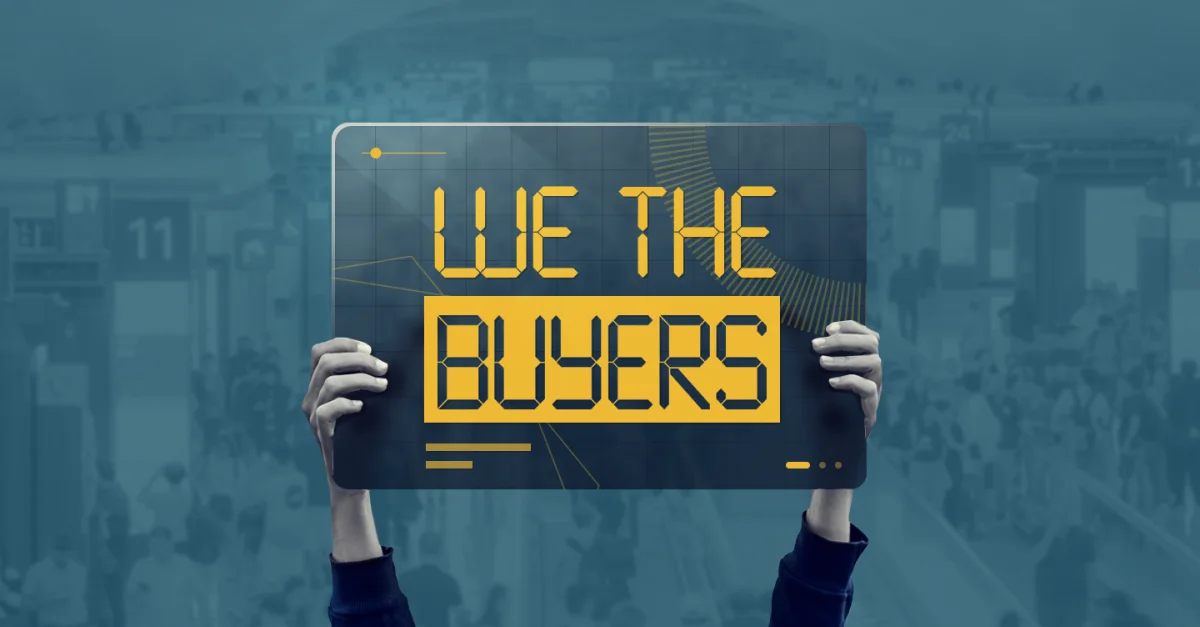A bill of rights for software buyers
In the era of tech overload, the buying experience—not just the tech stack—needs a makeover
When it comes to buying business software, first impressions matter. Vendors that provide exceptional buying experiences grow twice as fast as those offering average experiences, according to Gartner. In fact, the buying experience matters even more to prospective customers than the price or the product itself.
Yet the reality is that the B2B buying experience is often unnecessarily complex and costly. Between researching, pricing, customizing, and integrating enterprise software, buyers face a rocky path to user adoption and ROI. Compounding the problem, the average number of marketing and sales touchpoints in a B2B buying experience has doubled in the last five years.
Small wonder, then, why more businesses are demanding a customer-centric approach for software that mirrors the ease of buying in the consumer world.
What, exactly, should they be demanding? We talked to a range of executives and industry consultants on both sides of the buy/sell fence; what follows here is a list of standards every player in the industry should insist upon.
1. Make pricing simple and transparent
Regardless of what a buyer is seeking in a purchasing experience, everyone has an eye on the bottom line. But the way pricing information is delivered matters as much, if not more, than the price itself.
For instance, G2 found that 61% of B2B software buyers say they are less likely to invest in software if the vendor requires personal data (name, email, etc.) to view prices. Gating prices shifts power away from the purchaser, detracting from customer centricity. Some vendors also employ complex pricing structures, hidden fees, and licensing agreements.
Read also: A glimpse at the future of AI-powered sales
Buyers should demand clarity and simplicity in pricing, enabling them to make informed decisions without extensive negotiations. Vendors, in turn, should respect buyers’ time by embracing transparent pricing practices. This includes clearly stating total cost of ownership (TCO), offering a clear breakdown of features and services per plan, and eliminating hidden fees. Even more efficient and empowering are self-service pricing tools that don’t require speaking to a sales team (a task that increasing numbers of purchasers seek to avoid). By providing an upfront and transparent pricing experience, vendors set the stage for ongoing value delivery and lay the groundwork for trust.
2. Give buyers a fair trial
To make informed decisions, buyers need ample opportunities to evaluate software solutions firsthand. Vendors should provide free trials, sandbox environments to test customization capabilities, and extensive documentation for potential buyers to gain a comprehensive understanding of a software's capabilities and limitations before making a commitment. Customers don’t appreciate being rushed through the buying process. As one executive explained to McKinsey, B2B purchasers “want to engage on their time, not your time.”
Vendors that embrace free trials will likely see the rewards. Many software buyers won’t engage in more than one trial: Once they’ve seen firsthand that a product works for their needs, they’re more likely to make confident purchasing decisions and become satisfied long-term customers.
But not all free trials are good ones. According to Gartner, many companies find the free trial process confusing and complicated. Struggling with software setup can consume the trial time, making it difficult for buyers to envision its use. The key is design: Enterprise software with an intuitive, simple design allows buyers to see how the tool will support their core use cases.
3. Make integration easy
The number of software applications that a typical company manages has nearly doubled since before the 2020 pandemic. Consequently, the ability to integrate enterprise software with existing systems is critical in accelerating time to value (TTV).
In fact, ease of integration is a must-have for 82% of buyers, according to G2 data, outranking cost and security. Vendors should embrace architectures that help buyers adapt software to changing needs without leaning on armies of consultants. They should make customization easy and straightforward because these days, flexibility is the bare minimum, not a bonus. Buyers will get more from tools sooner—and see value earlier in the buying process.
4. Deliver world-class customer support
The software buying journey is getting longer and more complex, and purchasing decisions are increasingly done by committee: Over 80% of companies rely on groups with 22 roles involved. But most of those people aren’t tech experts: Just 33% of software buyers consider the IT department the final decision-maker for software purchases, down by 10% from 2021.
Brandon Kirkpatrick, founder of Catalyst Consulting Group, says this trend means vendors should go above and beyond when it comes to offering clear, value-driven insights about their products’ benefits.
“Software companies can’t address just the niche user anymore,” says Kirkpatrick. “They have to provide information that speaks to all of the decision-makers involved in the process.”
Experience matters
Over 70% of businesses say a lackluster buying experience without their core must-haves—performance guarantees, always-on customer service, online demonstrations, consistent experience, and multichannel purchasing options—will drive them to look elsewhere for their needs.
Tatsiana Kerimova, CEO of mobile app development company Orangesoft, underlines how value delivery matters at every stage of customer experience: “In order to deliver value for customers, companies have to be thinking about their customer's time.”
It’s time for vendors and buyers alike to respect buyers’ time in the buying process.
We want to hear from you! Please send us your feedback, and get informed about exciting updates from The Works. Drop us a line: theworks@freshworks.com
